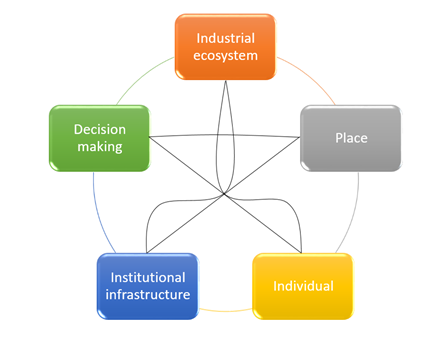In this blog, Tasos Kitsos introduces the latest output for the WM REDI project Economic resilience to shocks: implications for labour markets.
The term economic resilience has become popular during the 2008 crisis and remained at the forefront of research and policymaking since. The economic impact of the COVID-19 pandemic makes resilience more relevant than ever, with all relevant stakeholders looking for ways to shield local economies and accelerate recovery.
The WM REDI project ‘Economic resilience to shocks: implications for labour markets‘ aims to contribute to uncovering the determinants of local economic resilience and assist places to recover faster.
As the first step in this effort, a document has been compiled to bring together the evidence base around local economic resilience. In it, we discuss the concept and measurement of economic resilience as well as the evidence on resilience determining factors. We group these in five interconnected realms:
- Industrial ecosystems covering characteristics such as the specialisation and dynamism of local economies
- Place characteristics representing path dependency and physical geography
- Individual characteristics such as qualifications and demographics
- Institutional infrastructure attributes such as the fitness of national and local institutional set-ups
- Decision-making covers matters of agency and leadership.

The document is expected to be a live resource that will be updated regularly. As a result, we welcome feedback on all aspects as well as resources to be added to the review. After all, achieving resilience requires a concerted effort across multiple scales and fields.
Economic Resilience Discussion Document
This blog was written by Dr Anastosios Kitsos, Research Fellow, City-REDI / WM REDI, University of Birmingham.
To sign up for our blog mailing list, please click here.
Disclaimer:
The views expressed in this analysis post are those of the authors and not necessarily those of City-REDI / WM REDI or the University of Birmingham

